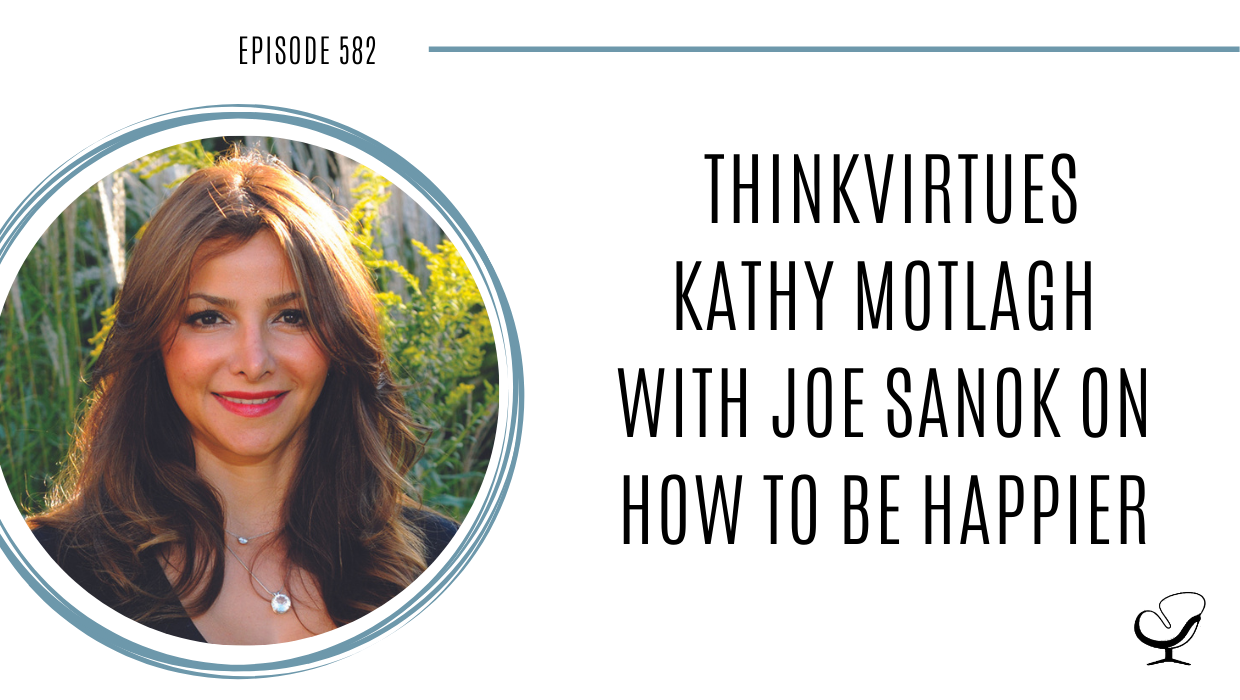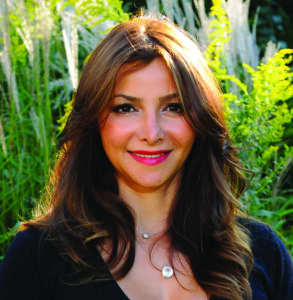Podcast: Play in new window | Download | Embed
How can you create a life that feels most genuine to who you are? Is there a link between slowing down and finding your life purpose? What is the difference between the prescriptive model and the menu model?
In this repurposed podcast episode, Joe Sanok is being interviewed by Kathy Motlagh from ThinkVirtues about how to be happier.
Podcast Sponsor
 Try out TherapyNotes! It makes notes, billing, scheduling, and telehealth a whole lot easier. Check it out and you will quickly see why it’s the highest-rated EHR on TrustPilot with over 1000 verified customer reviews and an average customer rating of 4.9/5 stars.
Try out TherapyNotes! It makes notes, billing, scheduling, and telehealth a whole lot easier. Check it out and you will quickly see why it’s the highest-rated EHR on TrustPilot with over 1000 verified customer reviews and an average customer rating of 4.9/5 stars.
You’ll notice the difference from the first day you sign up for a trial. They offer live phone support 7 days a week.
So when you have questions, you can quickly reach someone who can help, you are never wasting your time looking for answers.
If you are coming from another EHR, they make the transition really easy. TherapyNotes will import your clients’ demographic data free of charge during your trial so you can get going right away.
To get 3 free months of TherapyNotes, no strings attached including their very reliable telehealth platform click here.
Meet Kathy Motlagh
Throughout her professional career, Kathy Motlagh has provided people of all ages with choices. Believing that personal accountability is an ongoing commitment, she has raised the bar in helping individuals find their authentic self and moral compass.
In corporate settings, her Power of Authenticity workshop and other proprietary programs set ground rules for healthy interactions through inspiring self-realization, cultivating intention and purpose while driving positive change. Participants report greater employee engagement and improved organizational culture, and a healthier bottom line.
As a parent, Kathy has always understood the importance of morality. Seeing the teaching of virtues as lacking in schools, she took the initiative and developed an educational platform for parents and teachers on the benefits of living a virtuous life. She believes virtues are who we are, and in order to be our best self, we must exercise our virtues’ muscles daily.
She and her sister launched ThinkVirtues™ with the goal of reversing the effects of bullying and abusive behavior and giving children the power to stop them at the first sign. The organization aligns educators and parents in teaching children good moral values.
Through her work with proactive parents, educators, and corporate leaders, Kathy has turned up the volume on morality, helping people engage in a healthy manner, find their purpose, and create better work/life balance.
Her passion and advocacy for children’s empowerment also ignited her to author the Eutopia Book Series, which models and inspires moral choices for children in exciting adventure stories.
Visit her counseling website. Connect on Twitter, LinkedIn, and Facebook.
In This Podcast
- Joe’s notes on positive psychology
- Living a life that feels genuine to you
- Joe’s tips for slowing down
- Internal inclinations
- Updating a negative mindset
Joe’s notes on positive psychology
1 – The pandemic was a magnifier for the good and bad:
It emphasized what was going on in your life and made things that were already bad worse and things that worked well into instant successes.
Post pandemic when we think about the mind and about how we approach change and conflict and hurt – all the things that are human that come into our business world or into our emotions – we can’t forget those lessons, both the positive and the negative things that happened through the pandemic. (Joe Sanok)
We have learned, and can still learn from the pandemic, how to sit with ourselves and be honest with what we need and how we feel. We can recognize what we need and how we can serve ourselves because we were forced to understand what we as individuals need to feel secure, whole, and nourished.
2 – A lot is out of our control:
The pre-pandemic Western view around chasing your dreams was centered around fighting what you want, forcing it into your life. Now, post-pandemic, we have learned and have been shown how much is out of our control.
We have learned that instead of fighting to be in control of every aspect of the situation, we are only in control of ourselves and in control of our response to a situation.
Living a life that feels genuine to you
How can you construct your life so that it resonates with what is most important to you as an individual? Joe recommends:
- Starting with your schedule: how you structure your time is directly linked to how you interact with the important aspects of your life.
Do you make conscious time for your principles? Are you sometimes wasteful with your free time because you work too much?
Before we can ever talk about mindfulness and finding your purpose … we have to [ask] “what’s our baseline stress?” how does the average American typically live? (Joe Sanok)
How does rest lead to purpose?
Recent research has shown that when we focus on slowing down first, we can actually get more work done in those fewer hours because we allowed ourselves to rest and make time for what we find important in our lives.
Resting allows you to:
- Connect to your life purpose because it gives you the pause that you may need to realize that up until this point you have been potentially wasting your time.
- Recuperate and allows you to evaluate how you have been living thus far, and therefore make decisions that actually lead to change instead of staying stuck in repeating cycles.
Tips for slowing down
1 – Listen to your body:
If you have constantly pushed yourself, forced, or punished yourself even for doing things you thought you were not supposed to, it might be difficult in the beginning to trust your body and honor what it asks of you.
However, learning to listen to what you need will help you to best serve yourself and your abilities. Perhaps you want a hike in the mountains or a slice of cake, or to sleep in, or to go for a morning walk.
It might look different, but nurturing self-awareness is key to understand what you and your body need and how you can help yourself.
2 – What is the best use of your time?
When you wake up in the morning, how can you protect your energy and your brain from other people’s agendas so it can be fresh and awake for you? What morning routine can you create that helps you to be your best self?
Internal inclinations
Curiosity
Encourage your curiosity to flourish because it opens you up to a plethora of new possibilities and potentialities that you might not have considered before.
Having an outsider perspective
Research has shown that outsiders often have more influence than insiders. Be an outsider because it encourages you to look at the same situation that everyone else does in a different way.
Having the ability to move on it
Have the ability to move on your convictions. If you are wanting to do something new but you are stuck on wanting to be fully accurate first before starting, you might be waiting forever. Accuracy comes from practice, and you can only practice once you have started.
Have the bravery to be speedy when it comes to trying out new ideas instead of getting stuck.
For most of what people do, speed over accuracy is almost always what we want, in the ability to move on it. (Joe Sanok)
Updating a negative mindset
Start with:
- The basics: evaluate how you are sleeping, eating, how often you are exercising, and so forth. We cannot expect our minds to function at an optimum level when we are not taking care of our physical health.
- Then, your natural inclinations: consider your curiosity and all the things you want to try and whether or not you are actually moving towards them.
- Then, move into slowing down to optimizing your brain in a different way. Pay attention to what optimizes your brain for the next day, or the current day.
Do not underestimate the little things, because those micromovements can be what really shifts things,
Lastly, understand your sprint model: what do you do to really work on what inspires you? Do you need a weekend away, or spend a few hours doing hardcore work once a weekend?
Books mentioned in this episode
Useful Links:
- Ask Joe: How to Narrow Down a Niche? | PoP 581
- Thursday Is The New Friday
- Starting a private practice? Get this free 28 step checklist
- Sign up for Next Level Practice
- Events – click on the event’s dropdown
- Sign up to join the free webinars and events here
- Podcast Launch School
- Practice of the Practice Podcast Network
- Free resources to help you start, grow, and scale
- Apply to work with us
Meet Joe Sanok
Joe Sanok helps counselors to create thriving practices that are the envy of other counselors. He has helped counselors to grow their businesses by 50-500% and is proud of all the private practice owners that are growing their income, influence, and impact on the world. Click here to explore consulting with Joe.
Thanks For Listening!
Feel free to leave a comment below or share this podcast on social media by clicking on one of the social media links below! Alternatively, leave





